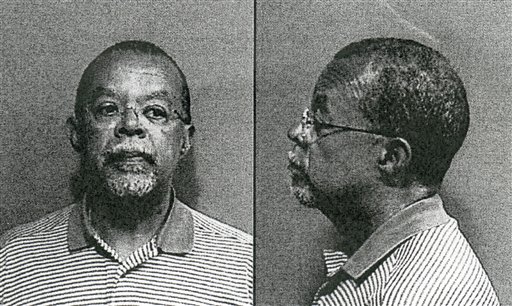 How I spent my summer vacation: Dr. Henry Louis Gates’ mugshot
How I spent my summer vacation: Dr. Henry Louis Gates’ mugshot
As the final questioner at last night’s press conference in support of Barack Obama’s health care plan, The Chicago Sun-Times‘ Lynn Sweet asked the President for his thoughts on the recent arrest of Harvard University’s Dr. Henry Louis “Skip” Gates, above. As certainly anyone at all knows by now, Dr. Gates, a few days earlier, had suffered the indignity of being arrested for the crime of being in his own home, in a case now widely being seen as one of so-called “racial profiling.”
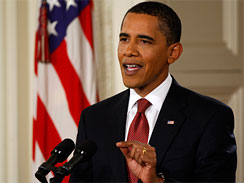 President Obama, right, gave a nice, reasonable answer, of the kind at which he is, arguably, flawless. He cracked a joke or two. He appealed to a sense of fairness that the blindingly white press pool, no doubt, possesses as fair and balanced journalists. He said he didn’t know “what role race played” in Gates’ mistreatment, but then cited “a long history in this country of African Americans and Latinos being stopped by law enforcement disproportionately,” adding, for certainty. “That’s just a fact.”
President Obama, right, gave a nice, reasonable answer, of the kind at which he is, arguably, flawless. He cracked a joke or two. He appealed to a sense of fairness that the blindingly white press pool, no doubt, possesses as fair and balanced journalists. He said he didn’t know “what role race played” in Gates’ mistreatment, but then cited “a long history in this country of African Americans and Latinos being stopped by law enforcement disproportionately,” adding, for certainty. “That’s just a fact.”
He said that “the Cambridge Police acted stupidly,” that quote being the one which, subsequently, was the most widely reproduced, and, to this writer, the one that came the closest to expressing any sort of a feeling or passion about the incident on his part.
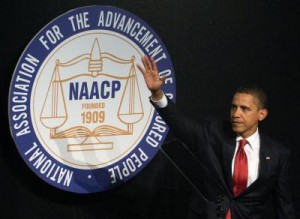 What he did not say, however, or speak to, was the irony of what I had immediately noticed, soon as word of Gates’ arrest hit the wires: The scholar’s detainment had occurred mere hours before Obama gave his address, right, at the NAACP’s 100th anniversary convention. There, in the grand ballroom of the Hilton Hotel in New york City, the nation’s first Black president had hailed the organization’s history and astounding struggle, efforts which, in his own words, had directly led to his being “here tonight as the 44th President of the United States of America.”
What he did not say, however, or speak to, was the irony of what I had immediately noticed, soon as word of Gates’ arrest hit the wires: The scholar’s detainment had occurred mere hours before Obama gave his address, right, at the NAACP’s 100th anniversary convention. There, in the grand ballroom of the Hilton Hotel in New york City, the nation’s first Black president had hailed the organization’s history and astounding struggle, efforts which, in his own words, had directly led to his being “here tonight as the 44th President of the United States of America.”
It was a dumb speech, made to a bunch of dumb people. By this, I don’t mean that Obama is dumb, or that his NAACP benefit audience is, either. What I mean is that it seems impossible for Barack Obama to address a large crowd of Black people as equals, or even, really, as constituents. As Jesse Jackson said a year ago when he thought his mic was off, I often feel like Obama is talking down to Black audiences. For example, whenever he speaks to a lot of us at once, the form and content of his language is not detailed, procedural, or strategic, but allusive, poetic, and folksy.
It’s almost like he slips into the semantic-textual equivalent of that detestable, quasi-Southern Black preacher’s accent Hillary Clinton would employ at African-American churches during her campaign. To Obama, filching a familiar term he used in his NAACP speech, we appear to strike him as one gigantic, nationwide amen corner. But when he “goes to church,” as he does at the end of his NAACP speech, shouting proclamations to the excited cheers of the audience, like there was an organ playing hot syncopations nearby, it’s a brassy, rhythmless mess, without the succulent gasps, holds, and shouts that encircle the Black religious experience when choreographed by, well, Jackson, or Obama’s once Obi-Wan/now Darth, Jeremiah Wright.
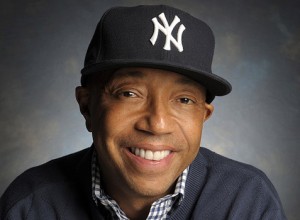 Even Def Jam mogul Russell Simmons, right—perhaps, in part, because he’s reportedly BFFing the sleazy Republican National Committee chair, Michael Steele—said July 24, on Twitter,
Even Def Jam mogul Russell Simmons, right—perhaps, in part, because he’s reportedly BFFing the sleazy Republican National Committee chair, Michael Steele—said July 24, on Twitter,
The speech @ naacp was more inspiring if he as a preacher. But the president could tell us about sending our kids to college. Minister farakahn or michael steele could give us the lift yourself rap (we need that too) where’s the special programs for the poor? I know the President can only do so much. He’s doing a lot, But I was not as happy as some blacks with the conservative speech
Actually, Russell is right: When the president shows up, he brings, by default, the Big Guns. They’re called policy. But Obama doesn’t deliver policy when he talks to Black people, either because he feels we want more chu’ch, or perhaps because anything that could really work for Black people—a Black Marshall Plan, say—would not only disastrously drain “white resources”—what they, collectively, perceive to be “theirs”—but would be political hara-kiri. As such, by necessity, help for Black people must be filtered through white people, so it does not appear that the president has crafted any sort of “special treatment” for the members of his own racial group.
He’s said as much. Carefully consider the language of this response, below, from his June 23rd press conference. Keep in mind that Black economic indicators during good periods are normally what white people are generally experiencing now.
Q: Mr. President, people are criticizing this road to recovery plan. Specifically, there are reports in The Washington Post that say that the African America unemployment rate will go to 20 percent by the end of this year. And then you had your Chairman of Economic Advisers say the target intervention may come next year if nothing changes. Why not target intervention now to stop the bloodletting in the black unemployment rate?
THE PRESIDENT: Look, first of all, we know that the African American unemployment rate, the Latino unemployment rate, are consistently higher than the national average. And so, if the economy as a whole is doing poorly, then you know that the African American community is going to be doing poorly, and they’re going to be hit even harder. And the best thing that I can do for the African American community or the Latino community or the Asian community, whatever community, is to get the economy as a whole moving. If I don’t — hold on one second, let me answer the question — if I don’t do that, then I’m not going to be able to help anybody. So that’s priority number one.
It is true that in certain inner-city communities, the unemployment rate is — was already sky high even before this recession. The ladders available for people to enter into the job market are even worse. And so we are interested in looking at proven programs that help people on a pathway to jobs.
There was a reason why right before Father’s Day I went to a program here locally in Washington called Year Up, which has a proven track record of taking young, mostly minority people, some of whom have graduated from high school, some maybe who’ve just gotten their GED, and trained them on computers and provide them other technical skills, but also train them on how to carry themselves in an office, how to write an e-mail — some of the social skills that will allow them to be more employable. They’ve got a terrific placement rate after this one-year program. If there are ways that we can potentially duplicate some of those programs, then we’re going to do so.
So part of what we want to do is to find tools that will give people more opportunity, but the most important thing I can do is to lift the economy overall. And that’s what my strategy is focused on.
Most of all, though, as the nation’s first Black president, but one who grew up with a white mother, one often gets the sense that Obama’s internal race narrative is psychically approved, in advance, by white people.
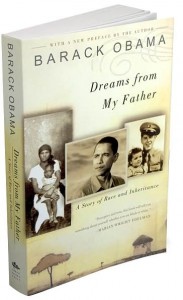 Of course, there actually is no need for such a vetting. As a person who, his entire life, as he notes in his 1995 memoir, Dreams from My Father, right, “learned to slip back and forth between my Black and white worlds,” Obama early acquired a critical survival technique: “People were satisfied so long as you were courteous and smiled and made no sudden moves. They were more than satisfied; they were relieved — such a pleasant surprise to find a well-mannered young black man who didn’t seem angry all the time.” This perfectly describes the tenor of his speeches.
Of course, there actually is no need for such a vetting. As a person who, his entire life, as he notes in his 1995 memoir, Dreams from My Father, right, “learned to slip back and forth between my Black and white worlds,” Obama early acquired a critical survival technique: “People were satisfied so long as you were courteous and smiled and made no sudden moves. They were more than satisfied; they were relieved — such a pleasant surprise to find a well-mannered young black man who didn’t seem angry all the time.” This perfectly describes the tenor of his speeches.
For example, am I the only journalist who noticed that, in his NAACP address, Obama did not once say the word racism?
Does this make sense? I mean, isn’t racism what the NAACP has been fighting against for the past century? If President Obama addressed the Anti-Defamation League, would he mention “anti-Semitism,” or “cancer,” if he was speaking to the Cancer Society?
During his NAACP talk, Obama observed that “the pain of discrimination is still felt in America…by African American women paid less for doing the same work as colleagues of a different color and a different gender.”
Huh? A question for Black people: Have you ever been around Black folk who, when saying “White people” in proximity to some, sound those words out in a faint stage whisper—”White People!“—while exaggerating their facial expressions to compensate for the soft volume? Perhaps you do this. Nearing 2010, talking about “colleagues of a different color and a different gender” is the gifted orator’s equivalent of doing exactly that.
Of course, though, the reason Obama doesn’t talk about racism is because, if you say it, you have to say what it is when asked. Or you have to lie. As an esteemed mentor has often said to me, “You can’t talk about racism with out doing two things, right off the bat: Embarrassing white people, and offending Black people. You can’t do it if you’re going to tell the truth.” When asked what racism is, I say two words: White supremacy. For some reason, a lot of white people go nuts when you do that, or, seemingly, try not to.
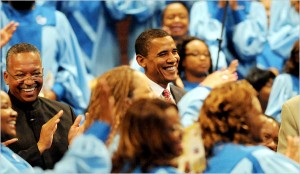
So, why bother? Black people don’t need him to say it, for the most part, because, to a great extent, they’re just glad to see him in office, looking sharp and sounding smart. I wrote about this almost exactly a year ago, here, on MEDIA ASSASSIN, in “The Speech Barack Obama Could Have Given to White Fathers If He Wasn’t So Busy Talking Down to Black People.” Much as his 2008 Father’s Day speech did at Apostolic Church of God in Chicago, above, major parts of his NAACP keynote focused on telling Black people how to raise their kids. Has Obama ever made this speech before white parents? (He definitely has never said the version in my article.) I mean, given Obama’s own admission about his dad—that, as a child, he “probably was shaped more by his absence than his presence”—this oft-repeated advice comes off almost like a form of passive aggression..
In the end, though, Obama didn’t have to speak about racism, perhaps. One hundred and eighty-five miles away from the Hilton, having been pointed out by some otherwise nondescript white woman passing through his neighborhood, the man who is arguably America’s most prominent African American professor was sitting in a cell, lighting the path into the NAACP’s second century.

5 comments ↓
Potent, awesome and inside the real deal. Thank you MA.
Bj
Wow. Powerful post. Well argued. I see your point about not being addressed as equals, however the President did state very clearly that government has a role in addressing disproportionate resources.
My other thought is that when the President talks of issues of parental responsibility, it moves further into intra-community discussions of the same issues. I sometimes observe a hesitance to deal with such issues head on in casual discussions.
Edit – I meant ‘it pushes intra-community discussions further…’ (Too early for me to be trying to sound intelligent. ;))
Obama has to be careful with what he says, especially to black folks, he has “people to answer to” in his new job as President. Going to ch’urch was an insult, some people thought he was getting down with the get down. To quote James Brown, he was “talking loud and saying nuthin’ “. And he does have to go thru white people to get something/anything for black people, that’s just a fact. We wont see the Dave Chapelle reparations skit come to life. “I’m rich, bitch!”
The first time I’ve read your work and it won’t be the last.
Leave a Comment